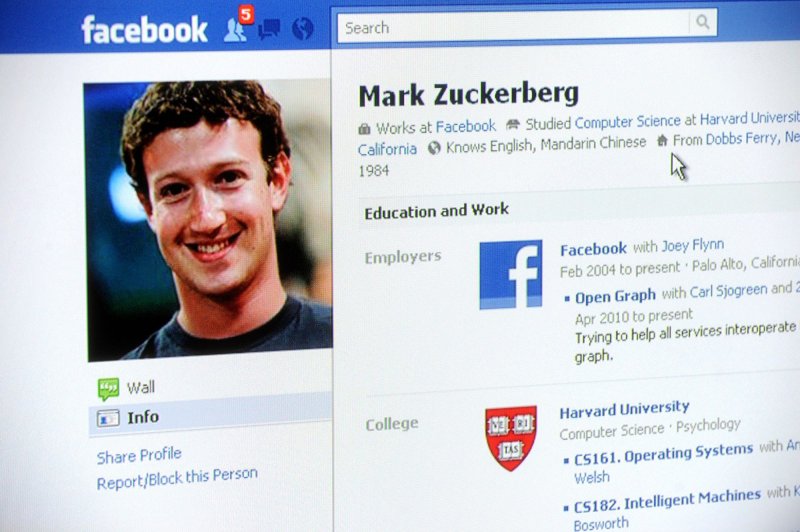The Facebook homepage of Mark Zuckerberg is displayed on the Internet on December 15, 2010. Zuckerberg, 26, has been named Time magazine's "Person of the Year" for 2010. Zuckerberg is the CEO and co-founder of Facebook. UPI |
License Photo
U.S. Internet firms are being dragged into the street fight in Egypt, whether they like it or not.
Last week, Twitter co-founder Biz Stone posted a blog that many assumed was a reaction to Egypt's Internet blackout. Stone said, "Our goal is to instantly connect people everywhere to what is most meaningful to them. For this to happen, freedom of expression is essential."
Stone did not mention Egypt in his posting and even came close to admitting how ironic it sounded to tweet messages with enormous political impact. "Some Tweets may facilitate positive change in a repressed country, some make us laugh," he wrote, putting urgent political messages in the same room as the joke about the salesman sitting on bar stool when in walks this gorgeous blond. Stone did say, "The open exchange of information can have a positive global impact," wherein, of course, lies the rub. One man's positive impact can be another man's funeral, when the Tweets hit the fan.
Egypt has a population of 81.5 million people and five million of those are members of Facebook. The Washington Post reported that the Web site was instrumental in passing along rants having to do with the killing of a prominent activist that escalated to massive street protests. The government is now back on its heels and President Hosni Mubarak has fired his entire cabinet and said he will not run for re-election in the fall.
"The movement (in Egypt) was very dependent on Facebook. It started with anger then turned into a legitimate uprising," said Alaa Abd El Fattah, who the Post identified as a prominent Egyptian blogger.
In Syria, Facebook has been banned for the past three years, but it is still used by some who change their identities to join. "John Smith from New Jersey wishes to announce he will be in Damascus next week and hopes a few hundred thousand of his friends will join him there to protest a repressive government."
News companies, of course, are aware of their sensitive role in times of political upheaval and develop thick skins because of that. Comparatively speaking, Facebook and Twitter are like companies that own the bulletin boards in laundromats and at the student unions on college campuses and seemed to expect their members would be announcing a sock hop on Saturday night, not a mass rally to overthrow the government.
Facebook spokesman Andrew Noyes said, "Although the turmoil in Egypt is a matter for the Egyptian people and their government to resolve, limiting Internet access for millions of people is a matter of concern for the global community. It is essential to communication and to commerce. No one should be denied access to the Internet."
But David Kirkpatrick, who has written a book about Facebook, said company officials are debating whether or not to tweak their policy that forbids anonymous postings, which would set up another level of complicity in street fights around the world.
"Many countries where Facebook is popular have autocracies or dictatorships, and most of the countries have passively tolerated their popularity. But what's happened in Egypt or Tunisia is likely to change other countries' attitudes, and they'll be more wary of Facebook operating there," he said.
In international markets Thursday, the Nikkei 225 index in Japan slipped 0.25 percent, while the Shanghai composite index in China added 0.3 percent. The Hang Seng index in Hong Kong rose 1.81 percent, while the Sensex in India surged 1.98 percent.
In Australia, the S&P/ASX 200 index rose 0.5 percent.
In midday trading in Europe, the FTSE 100 index in Britain shed 0.44 percent, while the DAX 30 in Germany lost 0.14 percent. The CAC 40 index in France lost 1.11 percent, while the Stoxx Europe 600 index lost 0.28 percent.















